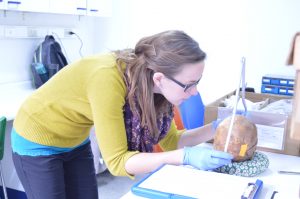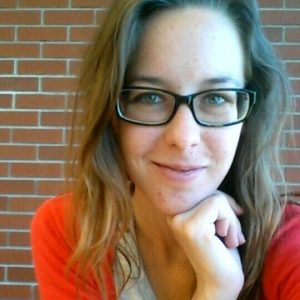Meet Rachel K.
- Major: Human Biology, Graduate Student
- Role: Rookie
- Hometown: Smithton, IL
- (May 2018 Team)
Why is this humanitarian work important to you?
This opportunity is especially unique in the nature of the interactions with the organizations in South Texas. I think it is essential to understand the context of our work from people who live with it every day, and experience that ourselves. Stepping outside our Midwest world to understand what the border crossers go through brings a completely new perspective to our own lives as well as the bigger picture of what we’re working towards – giving recognition to the crisis that is happening at the border and using the skills that we have to help return dignity and identity to those who have perished there.
What do you hope to gain from this experience?
My peers that have gone to Texas have always come back changed, because immersing yourself in this mission (searching for remains, working on the excavations, meeting the people involved, etc.) has an incredible impact on your attitude towards the world. Above all, I think what I see is the people with this opportunity change from being empathetic to being compassionate – a much stronger emotion that then drives them to continue this mission.

What are some of the biggest challenges you will face while in Texas?
Growing up on a farm, I’m no stranger to the kind of intense physical labor in hot conditions I expect we’ll be going through while we’re there. Honestly, I foresee most of the challenge to lie in the emotional labor that we’ll be going through, though I look forward to the development and growth that I’ll experience because of it.
What’s one thing people probably don’t know about you until they’ve known you a long time?
I’m not the biggest fan of chocolate.
When did you know you wanted to pursue human biology as a degree, and how did you become interested in forensics?
Funny story. I actually started my undergraduate degree as a double major (Math & Physics) with a minor in French. After a few years, some summer classes and a study abroad experience, I decided I wanted to pursue Anthropology as a major and dropped the others to minors. My main interest was in human evolution, though I love many aspects of the different fields of Anthropology. When looking for a grad program, I approached it knowing that my main interest was in working with human remains – I enjoyed it, and seemed to have a knack for the analyses. The way to create a career out of that seemed to be the forensics route. After canvassing the programs within a 10hr radius of St. Louis, I decided that UIndy was my top choice of all the schools I applied to…. and here I am three years later!
What advice would you give other students interested in pursing a human biology degree at UIndy?
Two things that I have found critical in grad school have been drive/motivation and critical thinking. Be curious! Always question the world around you, and be passionate about whatever it is you do. At the end of the day, your own determination is what will lead you to success.
What makes UIndy’s human biology program distinctive?
We learn how to be good scientists first, then apply those skills in forensic anthropology. Coming with such a strong interest in evolution transferred to a thorough enjoyment of my anatomy/osteology courses, where I can bring in some of my physics background when talking about biomechanics. I also revel in the theory-based discussion classes, where I can ask questions to push the boundaries of how we think about things and take away ideas applicable to so many different aspects of my life.
